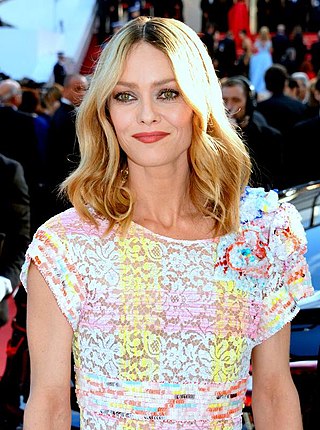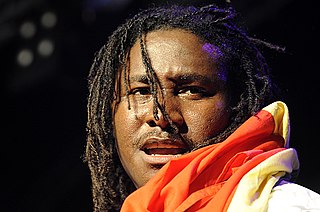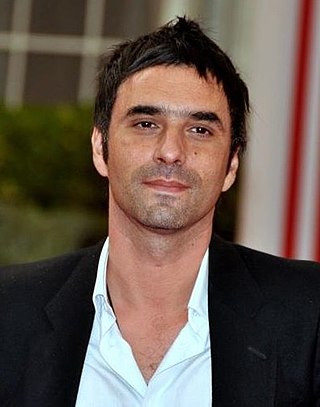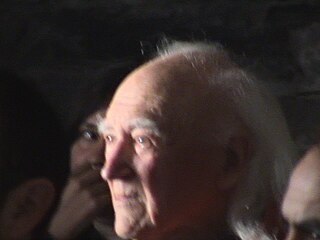Related Research Articles

The Politics of Benin take place in the framework of a presidential representative democratic republic, wherein the President of Benin is both head of state and head of government, and of a multi-party system. Executive power is exercised by the government. Legislative power is vested in both the government and the legislature. The Judiciary is independent of the executive and the legislature. The current political system is derived from the 1990 Constitution of Benin and the subsequent transition to democracy in 1991. The Economist Intelligence Unit rated Benin a "hybrid regime" in 2022.

Vanessa Chantal Paradis is a French singer, model and actress. Paradis became a star at the age of 14 with the international success of her single "Joe le taxi" (1987). At age 18, she was awarded France's highest honours as both a singer and an actress with the Prix Romy Schneider and the César Award for Most Promising Actress for Jean-Claude Brisseau's Noce Blanche, as well as the Victoires de la Musique for Best Female Singer for her album Variations sur le même t'aime. Her most notable films also include Élisa (1995) alongside Gérard Depardieu, Witch Way Love (1997) opposite Jean Reno, Une chance sur deux (1998) co-starring with Jean-Paul Belmondo and Alain Delon, Girl on the Bridge (1999), Heartbreaker (2010) and Café de Flore (2011). Her tribute to Jeanne Moreau at the 1995 Cannes Film Festival during which they sang in duet "Le Tourbillon" became notable in French popular culture. In 2022, she was nominated for the Molière Award for Best Actress for her performance in the play Maman.

Cinema of Africa covers both the history and present of the making or screening of films on the African continent, and also refers to the persons involved in this form of audiovisual culture. It dates back to the early 20th century, when film reels were the primary cinematic technology in use. As there are more than 50 countries with audiovisual traditions, there is no one single 'African cinema'. Both historically and culturally, there are major regional differences between North African and sub-Saharan cinemas, and between the cinemas of different countries.

Sarah Maldoror was a French filmmaker of European and Guadeloupean descent. She is best known for her feature film Sambizanga (1972) on the 1961–1974 war in Angola.

Henri Verneuil was a French-Armenian playwright and filmmaker, who made a successful career in France. He was nominated for Oscar and Palme d'Or awards, and won Locarno International Film Festival, Edgar Allan Poe Awards, French Legion of Honor, Golden Globe Award, French National Academy of Cinema and Honorary Cesar awards.

Didier Awadi is a Senegalese rapper and a significant figure in Francophone West African hip hop. As a founding member of Positive Black Soul (PBS) with Duggy Tee, Awadi toured around the world contributing to the international popularity of Hip Hop Galsen. Awadi works as a solo artist, accompanied by his crew PBS Radikal. He participates in the Senegalese music industry through his label, recording studio, and rehearsal space, Studio Sankara. Awadi offers a conscious and revolutionary style of music strengthened by articulated and rooted messages. His motivation and inspiration is grounded in the Burkinabé revolutionary Thomas Sankara's phrase: "Let's dare to invent our future!"

Samuel Benchetrit is a French writer, actor, scenarist, and director.
Sylvestre is a masculine given name of Latin origin derived from Silva, meaning the forest. Notable people with the name include:

Robert Morin is a Canadian film director, screenwriter, and cinematographer. In 2009, he received the Governor General's Award in Visual and Media Arts.

René Vautier was a French film director. His films, which were often controversial with French authorities, addressed many issues, such as the Algerian War, French colonialism in Africa, pollution, racism, women's rights, and apartheid in South Africa. Many were banned or condemned, and one caused him to go to prison for a year.
Beninese American are Americans of Beninese descent. According to the census of 2000, in the United States there are only 605 Americans of Beninese origin. However, because since the first half of the eighteenth century to nineteenth many slaves were exported from Benin to the present United States, the number of African Americans with one or more Beninese ancestors could be much higher. The number of slaves from Bight of Benin exported to present United States exceeded 6,000 people, although this might consist not only in Benin, but also washes the shores of Ghana, Togo and Nigeria. It is also important to note that they were slaves from modern Benin, who exchanged voodoo practices with Francophone African descendants in Louisiana. Currently, there are Beninese communities in cities such as Chicago or Washington, D.C., Philadelphia and in other states as New York. As of 2021, there were over 500 Beninese immigrants in the town of Austin, Minnesota.

The African Doctor is a 2016 French comedy-drama film based on the life of Seyolo Zantoko, the father of the musician Kamini. It was co-written by Kamini and directed by Julien Rambaldi. It stars Marc Zinga and Aïssa Maïga.
Africa Paradis is a 2006 satirical speculative fiction film written and directed by Beninese actor Sylvestre Amoussou. It was produced in France and Benin and was intended to comment on the situation of African refugees in Europe.
Elvire Adjamonsi is a Beninese filmmaker, actor, journalist and cultural developer. She is known for her documentary films and for her work in creating and managing film festivals and cultural institutions across Africa.
The Cinema of Benin refers to the film industry of the Republic of Benin in West Africa.
Christiane Chabi-Kao is a Beninese film director and screenwriter.
Arcade Assogba, is a Beninese filmmaker. He has contributed vastly to the cinema of Benin by making several workshops for digital communication for various major cultural events in Benin such as International Film Festival of Ouidah and the Benin International Theater Festival, Fitheb. He is also notable as the director critically acclaimed short film, ZanKlan.
Jean Paul Amoussou, popularly known by his stage name Oncle Bazar, is a Beninese actor, comedian, director, producer, video director and screenwriter.
L'orage africain: un continent sous influence is a 2017 Beninese drama film directed by Sylvestre Amoussou. The film won the Étalon de Yennenga prize at the 2017 PanaFilm and Television Festival in Ouagadougou.
Amoussou is a surname. Notable people with the surname include:
References
- ↑ Sylvestre Amoussou - Fiche Personne sur Africultures
- ↑ "Screening of 'Africa Paradis' in presence of Beninese Actor and Director Sylvestre Amoussou". Africavenir. 25 November 2012. Retrieved 4 September 2016.
- ↑ "Anti-colonial film gets rave reception at Africa fest". www.yahoo.com. Retrieved 2022-11-01.
- ↑ Danielle Kwateng-Clark, Africa’s Biggest Film Festival Awards Controversial Movie About Western Control, 13 Mar 2017.